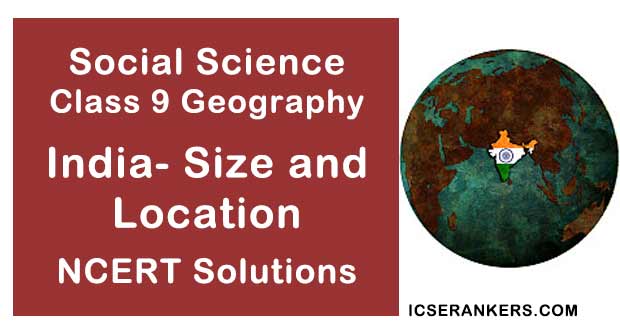NCERT Solutions Class 9 Social Science Geography Chapter 1 India - Size and Location

Chapter 1 India - Size and Location Questions and Answer
Chapter Name | India - Size and Location NCERT Solutions |
Class | CBSE Class 9 |
Textbook Name | Contemporary India Class 9 |
Related Readings |
|
(i) The Tropic of Cancer does not pass through
(a) Rajasthan
(b) Orissa
(c) Chhattisgarh
(d) Tripura
Answer
(b) Orissa
(ii) The easternmost longitude of India is
(a) 97∘25′E
(b) 68∘7′E
(c) 77∘6′E
(d) 82∘32′E
Answer
(a) 97∘25′E
(iii) Uttaranchal, Uttar Pradesh, Bihar, West Bengal and Sikkim have common frontiers with
(a) China
(b) Bhutan
(c) Nepal
(d) Myanmar
Answer
(c) Nepal
(iv) If you intend to visit Kavarati during your summer vacations, which one of the following
Union Territories of India you will be going to
(a) Pondicherry
(b) Lakshadweep
(c) Andaman and Nicobar
(d) Diu and Daman
Answer
(b) Lakshadweep
(v) My friend hails from a country which does not share land boundary with India. Identify
the country.
(a) Bhutan
(b) Tajikistan
(c) Bangladesh
(d) Nepal
Answer
(b) Tajikistan
2. Answer the following questions briefly.
(i) Name the group of islands lying in the Arabian Sea.
(ii) Name the countries which are larger than India.
(iii) Which island group of India lies to its south-east?
(iv) Which island countries are our southern neighbours?
Answer
(i) Lakshadweep
(ii) Russia, Canada, China, USA, Brazil and Australia.
(iii) Andaman and Nicobar group of islands.
(iv) Maldives, Sri Lanka.
3. The sun rises two hours earlier in Arunachal Pradesh as compared to Gujarat in the west but
the watches show the same time. How does this happen?
Answer
From the longitudinal extent of India it is observed that the longitudinal expanse is about 30° from west to east. This means that there would be a time-lag of two hours approximately from Gujarat to Arunachal Pradesh. To avoid such differences in local time, Indian standard time has been fixed to give the whole country a uniform time. The local time of the Standard Meridian of 82°30’E is observed as the Standard Time by the whole country. Because of this reason we find that the sun rises two hours earlier in Arunachal Pradesh as compared to Gujarat in the west but the watches show the same time.
4. The central location of India at the head of the Indian Ocean is considered of great significance. Why?
Answer
The central location of India at the head of the Indian Ocean is considered of great significance because:
- It has given India a strategic advantage due to the Trans Indian ocean routes which connect the countries of Europe in the West and the countries of East Asia.
- This helps India to establish close contact with West Asia, Africa and Europe from the Western coast and with the Southeast and East Asia from the Eastern coast.
- The vast coastline and the natural harbours have benefitted India in carrying out trade and commerce with its neighbouring and distant countries since ancient times.
- It has given India a distinct climate than the rest of the Asian Continent.
- No other country has such a long coastline on the Indian Ocean as India. It is India’s eminent position in the Indian Ocean which has given the name of an Ocean after it.
